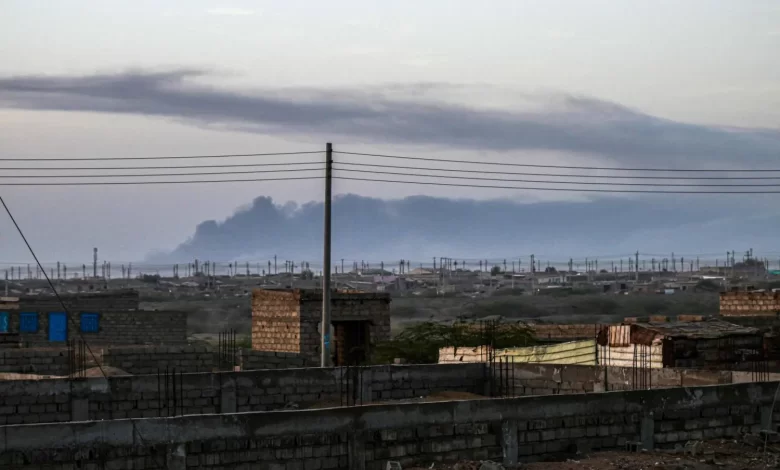What Does the Drone Strike on Port Sudan Airport Mean?

Report by Fath Al-Rahman Shubarka
The drone attack on the airbase in Port Sudan with eight “suicidal and strategic” drones on the morning of Sunday, May 4, has raised many questions about the implications of this new development in the course of the war in Sudan on several levels.
As fires erupted and smoke rose from the airbase, which was directly hit by a strategic drone, high-ranking military sources in the Sudanese army, speaking to Al Jazeera Net, downplayed the military and political impact of the drone attacks on the administrative capital, where Sovereign Council President General Abdel Fattah Al-Burhan resides and to which most state institutions relocated after the war broke out in Khartoum on April 15, 2023.
“Into the Enemy’s Depths”
Major General Al-Taher Abu Haja, former media advisor to Sovereign Council President Al-Burhan, told Al Jazeera Net that “using drones to target civilian facilities reflects the cowardice that has always characterized the Rapid Support Forces (RSF) and their backers and will not halt our advance into the enemy’s depth in Nyala and all their positions.”
He emphasized that the Sudanese airstrike on Nyala airport the previous day was painful for the “militia” and would be followed by even stronger strikes.
He stated they are well aware of the conspiracy threads and that Sudan, with its strong will, will not be an easy target. He also hinted at unconventional responses to the RSF’s attacks in the coming phase.
General Abu Haja was firm in stating that drones will never force the Sudanese army or government back into negotiations with the RSF.
The official spokesperson for the Sudanese army, Brigadier General Nabil Abdullah, said in a brief statement that “the enemy targeted the Osman Digna Airbase, a warehouse, and some civilian facilities in Port Sudan on the morning of May 4, 2025, using suicidal drones.”
He added that air defenses managed to shoot down several drones, while others caused limited damage, including a hit on an ammunition depot in Osman Digna Airbase that led to scattered explosions. No personnel were injured.
A Strategic Target
Sudanese Army Brigadier General Omar Abdulrahman Bashri told Al Jazeera Net that the drone attack on Port Sudan marks a new phase in the war against Sudan. He claimed the RSF lacks the capacity to plan and execute such attacks, describing it instead as the work of foreign mercenaries equipped with drones and weapons by the RSF’s backers.
He noted the attack was a predictable reaction to the severe blow the RSF suffered in Nyala on the morning of Saturday, May 3, after mistakenly believing they had neutralized Sudanese airpower—which had just destroyed a plane after it offloaded drones and ammunition and loaded wounded fighters from recent battles in An-Nuhud.
Bashri noted this wasn’t the first drone attack on Port Sudan. Earlier attempts targeted General Burhan during a military graduation ceremony in Jebeit and also targeted the Bashayer port near Suakin. No significant damage occurred as some drones were intercepted.
He emphasized that the Sudanese Armed Forces can absorb such attacks and turn them into positive momentum to eliminate the RSF, affirming confidence in military leadership and strategy aimed at eradicating the rebel force.
Public Discontent
While some viewed the drone strike on Port Sudan Airport as a message from the RSF and its backers to the Sudanese government, indicating they can strike anywhere, military analysts believe the strike will not yield tangible military or political gains for the RSF.
Bashri explained that the intent behind the attack was to stir public discontent, especially by targeting electricity and energy infrastructure, but asserted it would not significantly impact the war’s trajectory, which will ultimately be decided on the ground.
Conversely, others did not rule out that the drone strike—which aimed to slow the army’s advance—could disrupt air traffic to and from Port Sudan and increase the cost of travel to Sudan, as the city now hosts the only functioning international airport and seaport since the heavy destruction of Khartoum Airport.
Foreign Support
Military analyst and retired Brigadier General Ibrahim Aqil Madbo told Al Jazeera Net that the RSF’s recent intensified use of drones stems from the losses it suffered recently, including being ousted from central Sudan and Khartoum and cornered in Omdurman and Kordofan.
He asserted that targeting Port Sudan Airport was a reaction to the major loss the RSF endured in Nyala.
Regarding the implications of the RSF’s drone use, Madbo believes it signifies an evolution in their combat methods, possibly resulting from foreign support, new supplies, and training in drone operation, thereby enhancing their firepower and attack capabilities.
Madbo did not rule out that drones could shift the balance of power in the war unless the Sudanese Armed Forces respond swiftly and effectively to this growing threat.



